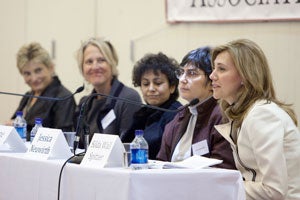On Friday, Feb. 19, the Women’s Law Association of Harvard Law School hosted the panel discussion “Change in the Community” as part of its fourth annual conference.
The panel, which focused on various ways in which women lawyers have advocated for and advanced women’s rights, featured Janet Benshoof, president and founder of the Global Justice Center; Page Gardner, founder and president of Women’s Voices. Women Vote; Irene Khan, former secretary general of Amnesty International; Jessica Neuwirth, director of the New York office of the United Nations High Commissioner for Human Rights; and Silda Wall Spitzer, founder of Children for Children.
View a video of the panel discussion.
Benshoof discussed her experiences as a female lawyer in public interest law, and described how important female mentors have been to her in her 38-year career, particularly Supreme Court Justice Ruth Bader Ginsburg. She also talked about her experiences with the U.S. State Department in Iraq, where she assisted Iraqi women leaders during the drafting of the Iraqi constitution.
“To me law is what is the true empowerment for women,” Benshoof said. “Human rights law is not to redress violations. We don’t need more laws for trafficking, we need more women judges. What’s important is that women become really entrepreneurs about using law to restructure the world, to restructure systemic inequality, which is very intrinsically related to dignity. … I feel that law is what will ultimately reshape the world.”
Gardner, a political strategist and non-lawyer, told the group, “To be successful you have to color outside the lines constantly.” On the subject of how women can figure out how to change their communities, she said,“You need to decide what your passion is in terms of changing the community. For me it was passion about injustice—whatever path I chose, whatever job I had. So seeing injustice, and having it knot at your very soul is the way to change your community…you think about how, every day when I wake up, how am I going to change things for the better for the people I care about most?”
Khan, the only non-American on the panel, described her Muslim upbringing in Bangladesh, and talked about how her observations during the “Liberation War” of 1971 (in which Bangladesh and Pakistan separated) led her to want to pursue a career in law. ““I wanted to study law because I thought that would be the path to justice.” She also noted that the “glass-ceiling” is no less present in the non-profit sector, and described her experiences with it as the female first head of Amnesty International in 40 years. “There are systemic structural barriers to women’s progress that we should think about,” Khan said. “It’s not just value-based.”
Neuwirth – who is also one of the founders of Equality Now, an organization dedicated to preserving and expanding international human rights for women – said that, although she came to HLS to study law, she “had no interest in being a lawyer,” and instead wanted to pursue her desire to work in human rights in other ways. HLS supported her interests by funding her summer internships in human rights, first in the former Soviet Union and then in South Africa, and her transition from her early career with Amnesty International to a position with a corporate law firm, where she learned about international finance and economics, and ultimately to her current position in the Office of the U.N. High Commissioner of Human Rights.
Spitzer, who is also currently the managing director of a woman-owned hedge fund, focused on how youth service, women’s issues, and issues of sustainability are all tied together. Given this variety of interests, her career path “has been not at all linear or straight in the way that you might think of it,” she said. Instead, her goal was “to try to leave the world a little better off than when I found it when I got here.”
“My mother is shorthand for the past, and a sense of feeling her frustration at the limitations on expectations and opportunities that were available for her,” she said. “My daughters to me are the future, so it’s about making sure that the gains that have been so hard acquired are actually taken advantage of and protected, and a sense of knowing how fragile they are and how quickly they could be lost if we aren’t vigilant about that.”
